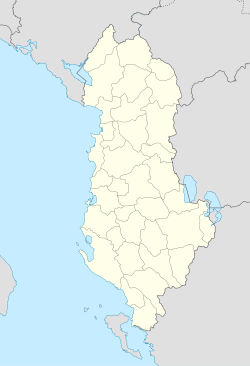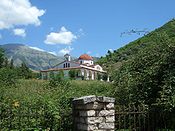- Delvinë
-
Delvinë Photo of the town Coordinates: 39°57′N 20°6′E / 39.95°N 20.1°ECoordinates: 39°57′N 20°6′E / 39.95°N 20.1°E Country  Albania
AlbaniaCounty Vlorë County District Delvinë District Population (2001) – Total 6,475 Time zone Central European Time (UTC+1) – Summer (DST) CEST (UTC+2) Postal code 9704 Area code(s) 0815 Car Plates DL Delvinë (Albanian: Delvinë or Delvina, Greek: Δελβινιον, Delvinion) is a small town in Vlorë County in southern Albania, 16 km northeast of Saranda. Delvinë is the seat of the Delvinë District. Delvinë has lost over a third of its citizens since 1990, having a population of 4,200 (2004 estimate).
The city is built on a mountain slope. It has a mosque, a Catholic church, a Protestant church, and an Orthodox church. Nearby are the remainders of a medieval castle. To the south west of the city is the site of ancient Phoenice, which was declared an Archaeological Park in 2005.[1]
There is little local employment apart from that provided by the State, and Delvinë benefits little from the tourist boom in Saranda.
The town has a mixed population of Albanians and Greeks. The latter, according to the Human Rights Watch, constituted 50% in 1989 and 25% in 1999 of the town's population.[2]
Contents
History
In antiquity the region was inhabited by the Greek tribe of the Chaonians. In the Middle Ages, Delvinë was part of the Despotate of Epirus. In the middle of the 14th century the aristocratic Delvina family ruled Delvinë. In 1354, Mehmet Ali Pasha Delvina was testified as the owner of the castle and the city.[citation needed]
Delvinë under Ottoman Turkish control
The Turkish traveler Evliya Çelebi visited Delvinë around 1670 and gave some information about the city in his travel book. He reported that in the Middle Ages Delvinë was in the hands of the Spanish and later the Venetians. In his own time, Ajaz Mehmet Pasha - a native Albanian - governed the Sanjak-bey of Delvinë. The sanjak covered 24 zeamets and 155 timars. There was a Turkish garrison, whose command on the castle was from Delvinë. According to the description of Çelebis, the small fortress had a good cisterne, an ammunition depot and a small mosque. In the city there were about 100 brick-built houses. These stood relatively far apart and nearly every house had a tower. He noted that a town wall was missing. There was several mosques, three Medreses and about 80 stores as well as an open market place.
In 1878 a Greek rebellion broke out, with the revolutionaries, mostly Epirotes, taking control of Sarandë and Delvinë. However, it was suppressed by the Ottoman troops, who burned 20 villages of the region.[3] In the early 20th century a çetë(armed band) consisting of 200 activists of the Albanian National Awakening was formed in Delvinë.[4] During the Balkan Wars and the subsequent Ottoman defeat, the Greek Army entered the city at March 3, 1913.[5] In June 1914 the town hosted the constituent assembly of the representatives of Northern Epirus that discussed and finally approved the Protocol of Corfu, on July 26, 1914.[6] Delvino then became part of the short-lived Autonomous Republic of Northern Epirus.
Jewish community
Until the Second World War, a small Jewish community existed in Delvinë. It consisted of Jews from Spain who had come to Delvinë when under Ottoman rule and had close connections to the large Jewish community in Ioannina. After the war, nearly all the Jews emigrated to Israel.
Education
The first school in Delvina, a Greek language school, was founded at 1537, when the town was still under Venetian control, and was maintained by bequests from wealthy local families.[7] Moreover, at 1875 a Greek female school was founded.[8]
Notable people
- Sulejman Delvina, fifth Prime Minister of Albania
- Avni bej Delvina, bej of the city, was one of the signatories of the Albanian Declaration of Independence.
- Limoz Dizdari, composer
- Ecumenical Patriarch Serapheim II of Constantinople, cleric and Ecumenical Patriarch of Constantinople
- Sabri Godo, writer and politician
References
- ^ Finiq - Albanian Tourism - Official Website
- ^ Nußberger Angelika, Wolfgang Stoppel (2001) (in German), Minderheitenschutz im östlichen Europa (Albanien), Universität Köln, http://www.uni-koeln.de/jur-fak/ostrecht/minderheitenschutz/Vortraege/Albanien/Albanien_Stoppel.pdf
- ^ M. V. Sakellariou. Epirus, 4000 years of Greek history and civilization. Ekdotike Athenon. ISBN 9789602133712, p. 292.
- ^ Skendi, Stavro (1967). The Albanian national awakening, 1878-1912. Princeton University Press. p. 421. http://books.google.com/books?id=qmm4AAAAIAAJ&q=kurvelesh#search_anchor. Retrieved 24 April 2011.
- ^ Veremis, John S. Koliopoulos & Thanos M. (2010). Modern Greece : a history since 1821 (1. publ. ed.). Malden, MA: Wiley-Blackwell. pp. 73. ISBN 9781405186810. http://books.google.com/books?hl=el&id=qumwwKbI0TQC&q=delvino#v=snippet&q=delvino&f=false.
- ^ Kondis Basil. Greece and Albania, 1908-1914. Institute for Balkan Studies, 1976, p. 132: "Throughout the period of the constituent assembly which convoked at Delvino to discuss the Corfu agreement... the constituent assembly approved the agreement on July 26, 1914."
- ^ M. V. Sakellariou. Epirus, 4000 years of Greek history and civilization. Ekdotike Athenon, 1997. ISBN 9602133716. p 308: "Another important school was that at Delvino...very high standard".
- ^ M. V. Sakellariou. Epirus, 4000 years of Greek history and civilization. Ekdotike Athenon, 1997. ISBN 9789602133712, p. 308
See also
Municipalities of Vlorë County Capital: VlorëDelvinë District 
Sarandë District Vlorë District Cities in Albania Bajram Curri · Bajzë · Ballsh · Berat · Bilisht · Bulqizë · Burrel · Cërrik · Çorovodë · Delvinë · Divjakë · Durrës · Elbasan · Ersekë · Fier · Fushë-Arrëz · Fushë-Krujë · Gjirokastër · Gramsh · Himarë · Kamëz · Kavajë · Këlcyrë · Klos · Konispol · Koplik · Korçë · Krastë · Krrabë · Krujë · Krumë · Kuçovë · Kukës · Kurbnesh · Laç · Leskovik · Lezhë · Libohovë · Librazhd · Lushnjë · Maliq · Mamurras · Manëz · Memaliaj · Orikum · Patos · Peqin · Përmet · Peshkopi · Pogradec · Poliçan · Prrenjas · Pukë · Reps · Roskovec · Rrëshen · Rrogozhinë · Rubik · Sarandë · Selenicë · Shëngjin · Shijak · Shkodër · Sukth · Tepelenë · Tirana · Ulëz · Urë Vajgurore · Vau i Dejës · Vlorë · Vorë

Northern Epirus & Greeks in Albania History Ancient Epirus (Chaones • Dassaretae) • Despotate of Epirus • Revolt of 1854 • Revolt of 1878 • Himara revolt of 1912 • Autonomous Republic of Northern Epirus • Protocol of Corfu • Battle of Morava-Ivan • Northern Epirus Liberation FrontSociety and Culture Greeks in Albania • New Academy • Zographeion College • Himariote dialect • Laiko Vima • Polyphonic song of Epirus • Postage stamps and postal history of Northern EpirusSettlements Ancient: Phoenice • Vouthroton • Apollonia • Thronium • Amantia • Antigonia • Antipatreia • Dimale • Oricum
Modern: Gjirokastër • Korçë • Himarë • Delvinë • Sarandë • Dropull • Pogon • Tepelenë • Permet • Leskovik • Ersekë • Moscopole • Bilisht
Other1: Nartë • Vlorë • Berat • Tirana • Elbasan • Durrës • Fier • ShkodërOrganizations Omonoia • Panepirotic Federation of America • Panepirotic Federation of Australia • Unity for Human Rights PartyIndividuals Benefactors: Alexandros Vasileiou • Apostolos Arsakis • Evangelos and Konstantinos Zappas • Ioannis Pangas • Georgios and Simon Sinas • Alexandros and Michael Vasileiou • Christakis Zografos • Literature: Theodore Kavalliotis • Katina Papa • Konstantinos Skenderis • Takis Tsiakos • Tasos Vidouris • Stavrianos Vistiaris • Andreas Zarbalas • Politics: Vasil Bollano • Georgios Christakis-Zografos • Vangjel Dule • Spiro Ksera • Military/Resistance: Kyriakoulis Argyrokastritis • Panos Bitsilis • Dimitrios Doulis • Konstantinos Lagoumitzis • Zachos Milios • Athanasios Pipis • Ioannis Poutetsis • Vasilios Sahinis • Spyromilios • Spyros Spyromilios • Sports: Pyrros Dimas • Sotiris Ninis • Panajot Pano • Leonidas Sabanis • Andreas Tatos • Clergy: Vasileios of Dryinoupolis • Panteleimon Kotokos Eulogios Kourilas
1 Cities and towns in Albania with Greek-speaking communities, outside the political definition of 'Northern Epirus'.Categories:- Populated places in Vlorë County
- Northern Epirus
- Epirus
Wikimedia Foundation. 2010.



